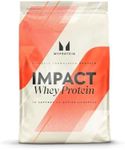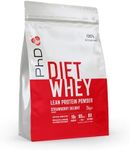Buying Guide for the Best Low Calorie Protein Powders
Choosing the right low-calorie protein powder can be a game-changer for your fitness and health goals. Whether you're looking to build muscle, lose weight, or simply supplement your diet, understanding the key specifications of protein powders will help you make an informed decision. Here are the main factors to consider when selecting a low-calorie protein powder.Protein ContentProtein content refers to the amount of protein per serving in the powder. This is crucial because protein is essential for muscle repair, growth, and overall body function. Typically, protein powders range from 15 to 30 grams of protein per serving. If you're aiming to build muscle or have higher protein needs, opt for powders with higher protein content. For general supplementation or weight loss, a moderate protein content may suffice.
Calorie CountCalorie count indicates the number of calories per serving. This is important for those who are monitoring their caloric intake, especially if the goal is weight loss. Low-calorie protein powders usually have fewer than 150 calories per serving. If you're looking to lose weight, choose a powder with lower calories. If you're using the powder as a meal replacement or for muscle gain, a slightly higher calorie count might be acceptable.
Type of ProteinThe type of protein used in the powder can affect its digestibility, allergen content, and nutritional profile. Common types include whey, casein, soy, pea, and hemp. Whey protein is fast-digesting and great for post-workout recovery, while casein is slow-digesting and good for sustained protein release. Plant-based proteins like soy, pea, and hemp are suitable for vegetarians and those with dairy allergies. Choose the type that aligns with your dietary preferences and needs.
Sweeteners and FlavoringsSweeteners and flavorings can impact the taste and healthiness of the protein powder. Some powders use natural sweeteners like stevia or monk fruit, while others use artificial sweeteners. Natural sweeteners are generally considered healthier. Additionally, flavorings can range from chocolate and vanilla to more exotic options. If you prefer a natural taste, look for powders with minimal or natural flavorings. If taste is a priority, explore different flavors to find one you enjoy.
Additives and FillersAdditives and fillers are extra ingredients that may be included in protein powders to enhance texture, flavor, or shelf life. These can include thickeners, preservatives, and artificial colors. It's important to read the ingredient list to avoid unnecessary additives that may not be beneficial to your health. Opt for powders with a clean ingredient list, especially if you have sensitivities or prefer a more natural product.
DigestibilityDigestibility refers to how easily your body can break down and absorb the protein. Some protein powders include digestive enzymes or probiotics to aid in digestion. If you have a sensitive stomach or digestive issues, look for powders that are labeled as easy to digest or include these additional components. This can help prevent discomfort and ensure you get the most out of your protein supplement.
















